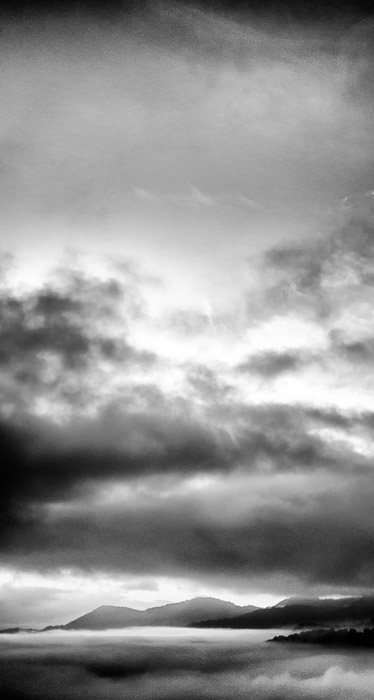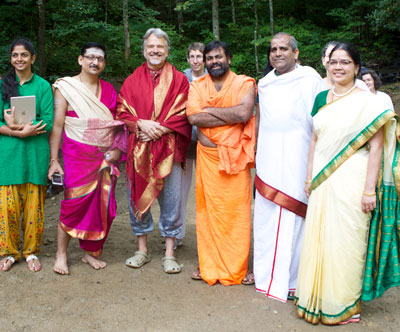by Michael Mamas | Saturday, February 7, 2015 | The Veda |
 Consider the following Vedic quote:
Consider the following Vedic quote:
Richo akshare parame vyoman yasmin deva adhi vishve nisheduh,
Yastanna veda kim richa karishyatiya it tad vidus ta ime samasate.
(Rig Veda, 1.164.39)
This essentially means that the knowledge of life (Vedic Knowledge) is rooted in awareness of the Transcendental level of life. It then points out that without awareness of that level, the meaning of Vedic literature slips through ones fingers. It asks the question, “If a person is not established in the transcendental level of life, what use are the verses of the Veda to him?” In other words, knowledge of life is not found in the memorization of facts, verses, or words. It lies deeper. It is more elusive. Repetition of wise words does not mean a person is wise. Wisdom lies deep within.
Now consider the following Vedic quote:
To the enlightened brahmin all the
Vedas are of no more use than is a
small well in a place flooded with
water on every side.
– Bhagavad Gita Chapter 2 Verse 46
Combining these verses can be viewed as a perplexing problem. The unenlightened cannot comprehend the Veda so what use is it to them? The enlightened already understand the Veda so they have no need for it. They already have ‘it’ so what use is it to them?
Just as these verses say, the resolution lies not in the surface but in the depth. Comprehension lies in the depth… in the transcendental level. It points out that ultimately a knower of Veda is not one who has memorized the texts or chants or Sanskrit language. A knower of Veda is one whose awareness is established in the transcendental level of life, even if he has never even read a single word of Vedic literature.
Of course, if ones relationship with the Vedic texts is wise, they can be used as a catalyst to assist one in awakening to the transcendental level. On the other hand, if the relationship is not wise, one may consider himself to be a knower of Veda, even a Vedic scholar, simply because the verses have been memorized. Consider the Vedic texts to be elusive Secret Doctrines. But understand that they are not secret because they are hidden away. They are secret because even after one reads and memorizes them, they remain a secret to that person.
Of course, the enlightened find great joy in reading the Vedic literature. They rest in the beauty, insight and knowledge of the words. They also find them of great value in assisting others to awaken to the transcendental level of life. Do not sell yourself short. The truth of the Veda dwells within you as You! You are a divine being. Spiritual growth means awakening to that… awakening to your true nature… the Truth that is found in the depth of Vedic Knowledge… the Truth of your Divine Nature.
© Michael Mamas. All rights reserved.
by Michael Mamas | Wednesday, December 17, 2014 | The Veda |
 As I read through Vedic Scripture, I see every sentence as elusive, so easily slipping through the fingers of the reader.
As I read through Vedic Scripture, I see every sentence as elusive, so easily slipping through the fingers of the reader.
Better to understand one line, than to memorize many. Yet understanding is not a set of concrete thoughts or perspectives… it is a place… of unending humble reflections within… without edges, without handles, ungraspable, yet full.
Consider the following:
Never be idle in your studies.” – Taittireeya Upanishad 1.11
What does ‘studies’ mean here? Isn’t every moment an ardent study for the wise, regardless of what they are doing? ‘Laughter, play, frivolity, or earnest academics… it doesn’t matter.
Isn’t no moment a study for the unwise, regardless of what they are doing?
Yet to not be idle does not mandate effort. It is the path of joy. Everything is profound, beautiful, and fascinating for the wise. The greatest emotion is fascination. Fascination is the root of all positivity in life. It makes the world spin around.
“Willed by whom does the directed mind go towards its object?” – Kena Upanishad
The only possibilities here are dharma, karma, or some combination of the two.
Action established in Being or action determined by karma.
Indeed, Dharma, in its truest sense is freedom. Yet some think of Dharma as bondage.
The ‘whom’ that directs the mind is the Self, if Dharmic.
The ‘whom’ that directs the mind is the Lord of Karma, if not Dharmic.
Dharma is the freedom of living ones true nature. Karma is that which shrouds ones nature. The confused often blur the two.
The number of such knots people tie themselves in is without limit.
Here is another example. If asked the question to what degree you are free, the wise person knows that question cannot be answered and thereby is free. Upon hearing the response of the wise, the unwise may choose not to answer the question and thereby considers himself free.
The beauty of knowledge ultimately lies in its elusive nature.
© Michael Mamas. All rights reserved.
by Michael Mamas | Friday, December 12, 2014 | The Veda |
“Not through discourse, not through the intellect, not even through study of the scriptures can the Self be realized. The Self reveals Himself to the one who longs for the Self. Those who long for the Self with all their heart are chosen by the Self as his own… Those who know the Self become the Self. Freed from the fetters of separateness, they attain to immortality.”
Like all aspects of the Veda, this quote from Mundaka Upanishad cannot really be understood until after the Self is realized. The crux here lies in the phrase, “longs for the Self”. What does that really mean? Often, longing may be thought of as an emotional state. But ‘longing’ here means much more.
Everything manifests from Oneness and everything gravitates back to Oneness. As the iron filing gets closer to the magnet, the pull gets stronger and stronger… as one gets closer and closer, the ‘longing’ is ‘with all of their heart’. Such longing is all consuming. It is not just emotional… it is physiological on all levels of ones being… it comes not from the emotional heart, but from the heart (the depth) of ones being. This is the experience of gravity in the broadest sense of the word ‘gravity’. It is Longing. It is not fully understood, not clearly understood, until after the Self is truly known. Along the path gravity pulls you…. there you find discourse, intellectual understanding, scriptures, etc. The closer you get, the stronger the pull, the clearer the vision, the more ardent the quest. Yet water remains water until it crystallizes into ice. Similarly, the Veda is not understood until the Self is realized. And then the word ‘understood’ takes on new meaning as well.
Echoes of Truth, perceived as Truth, hold Truth at bay. Echoes of Truth, perceived as echoes, assist one along the path back to Oneness… neti, neti, neti… not that, not that, not that. Humility comes with wisdom. To know everything is to know nothing.
Like water tumbling down a mountain stream, the gravitational pull is experienced in many ways with varying degrees of choppy chaos, swirling distraction, pooling stagnation, and utter confusion… with varying degrees of clarity of purpose, commitment, and understanding. At some point, the pull becomes so great that you will settle for nothing less than Truth. Everything else you have learned is then questioned. The veils of all indoctrinations, dogmas, misinterpretations, temptations, and identities are reexamined, discerned, and pierced… experienced as hollow and unsatisfying.
As if from afar, it calls you. Truth, in its purest form, is the only true focus of longing… the only nectar to quench that seemingly eternal thirst… the only healing balm… the balm of Pure Knowledge.

© Michael Mamas. All rights reserved.
by Michael Mamas | Monday, September 15, 2014 | Clarifying Confusion, Spiritual Evolution, The Veda |
If you think this quote from Mundaka Upanishad undermines Vedic knowledge in any way, then you do not understand the quote. It is speaking of the sublime and subtle relationship between the Pure Absolute and the finest finest level of existence. It is a beautiful commentary on the structure of existence. This topic seems to keep coming up which is why this is posted here. To those that seem to lose sight of the importance or even the possibility of their awakening to the Absolute, I would say read this quote. To those who would not understand or appreciate the profound value of reason, Vedic literature, and the Vedic rituals, I would say that you too do not understand this quote.
My life is one of dedication to knowledge… both aspects of knowledge. We are all in great debt to the Pandits and scholars who preserve and share Vedic knowledge. You must of course, keep your ‘eye on the ball’ as you pursue the Self… the ‘higher Knowledge’ that is spoken of in the quote… enlightenment. When held and understood properly, you understand the exquisite relationship between the two. Each honors and reveres the other.
 Directly experience the Self through PROPER meditation. Learn and practice the
Directly experience the Self through PROPER meditation. Learn and practice the
Surya Ram Meditation and Surya Ram Meditation with Advanced Technique…From Mundaka Upanishad:
1)
This Self cannot be obtained by studying the scriptures,
nor through the use of reason,
nor from the words of others
-no matter what they say.
By the grace of the Self is the Self known,
The Self reveals Itself.
2)
‘Those who know Brahman,’ Angiras replied,
‘say that there are two kinds of knowledge,
– the higher and the lower.
The lower is that of the four Vedas
– Rig, Sama, Yajur, and Atharva,
and of the accompanying sciences:
pronunciation, ritual, grammar,
etymology, metre, and astrology.
But higher is that through which the Eternal
is directly experienced.
3)
But verily, these rituals are unsafe boats
They cannot reach the farthest shore.
The Vedic sciences are but the lower
The ignorant,
who take them as the higher,
sink once more into old age and death.
Though they think themselves wise and learned
they are fools lost in ignorance,
a prey to suffering,
wandering without direction,
like the blind led by the blind.
© Michael Mamas. All rights reserved.
by Michael Mamas | Sunday, September 7, 2014 | Announcements, The Veda |

Swamiji’s followers, Maharshi, Swamiji in orange, Pandit Prasad, Lakshmi (Panditji’s wife)
The Brahma Sutras are a portion of the Vedas that addresses Vedanta. Sri Adi Shankara in his commentary on the Brahma Sutras set forth the non-dualistic( Advaita) interpretation of Vedānta. It is said that knowledge is structured in consciousness. In other words, the knowledge a person has of any subject is a function not only of the information they have, but even more so it is a function of their level of consciousness. Certainly this is true when addressing a topic as sublime and profound as Vedanta and the Brahma Sutras. Even as it is stated in the Veda, Knowledge does not dwell in books, it dwells in the consciousness of enlightened individuals.
Furthermore, translations, interpretations of the texts themselves, interpretations of the commentaries, and the changes of subtle meaning of words and expression over time result in the study of Vedanta and Brahma Sutras texts and commentaries being an incredibly elusive field of knowledge.
Swami Paripoornananda Saraswathi, a renowned saint, scholar and visionary, recently visited Mount Soma. It was wonderful to spend time with him. Everyone at Mount Soma greatly enjoyed the talk he gave to the group. He and I became great friends, even in the little time we had together. I would love to some day offer a conference with him to discuss, not just academically, but experientially the Brahma Sutras and Vedanta. He and I did have the opportunity to privately have a brief discussion on the topic. It was fascinating. He is a great reservoir of knowledge. He has invited me to join him to tour and give lectures in India. I very much look forward to that magnificent opportunity. It is a great joy to have him as a dear friend.
© Michael Mamas. All rights reserved.
 Consider the following Vedic quote:
Consider the following Vedic quote:
 As I read through Vedic Scripture, I see every sentence as elusive, so easily slipping through the fingers of the reader.
As I read through Vedic Scripture, I see every sentence as elusive, so easily slipping through the fingers of the reader.


